
February 23, 2019; Boston Globe
It won’t stop. Until we make progress to decolonize wealth, the pain will continue. When men with power and wealth hold all of the cards, nonprofits are inevitably, inextricably part of a corrupt, “living anachronism,” in the words of Edgar Villanueva.
In this case, it was Robert Kraft, owner of the New England Patriots, who was charged on Friday with two counts of soliciting sex at a spa in Florida. Behind that story, and with some greater impact, is that police say they have uncovered a multimillion-dollar human trafficking and prostitution operation spanning two states and involving countless victims who were “shuttled from place to place,” according to the New York Times:
The sweep led to criminal charges last week against several rich, prominent men, including Robert K. Kraft, the billionaire owner of the New England Patriots; John Havens, former president and chief operating officer of Citigroup; and John Childs, founder of the private equity firm J.W. Childs Associates.
Beyond the lurid celebrity connection, however, lies the wretched story of women who the police believe were brought from China under false promises of new lives and legitimate spa jobs. Instead, they found themselves trapped in the austere back rooms of strip-mall brothels—trafficking victims trapped among South Florida’s rich and famous.
Nonprofits like Massachusetts’s My Life My Choice, a part of Justice Resource Institute, understand the scale of this global scourge, a criminal industry that forces some 24.9 million people worldwide into work or sex under inhumane, illegal, or otherwise unacceptable conditions, according to the Polaris Project.
As the Boston Globe also notes, Massachusetts created a separate crime for sex trafficking in its state laws only seven years ago.
Unfortunately, My Life My Choice benefitted from Kraft’s well-known philanthropic largesse, which includes both his family foundation and the New England Patriots Charitable Foundation.
Sign up for our free newsletters
Subscribe to NPQ's newsletters to have our top stories delivered directly to your inbox.
By signing up, you agree to our privacy policy and terms of use, and to receive messages from NPQ and our partners.
According to the Boston Globe, the nonprofit received a $100,000 donation from the Patriots Foundation in support of the My Life My Choice mission to end commercial sexual exploitation by empowering youth and their allies to fight back. Although the issue has remained somewhat under the radar in the US, the Polaris Project reports that up to 300,000 children are at risk of commercial sexual exploitation in America.
Reporter Danny McDonald wrote for the Globe that the nonprofit’s leadership was heartbroken by the allegations against Kraft, which Kraft has denied.
Hours after that news broke, Lisa Goldblatt Grace, executive director of My Life My Choice, said in a statement “the buying and selling of human beings is an egregious form of abuse. We are heartbroken by the allegations about Robert Kraft.”Bottom of Form
She added, “The New England Patriots Charitable Foundation has supported My Life My Choice in the past. We will await additional information before commenting further.”
In an ESPN video that ran during a 2016 awards show, Goldblatt Grace hailed Kraft for donating $100,000 to the group. Kraft was being honored with an award for helping disadvantaged people at the time. A spokesman for My Life My Choice confirmed that donation on Friday.
It’s not the first time a nonprofit has to reckon with a tainted donation, and it won’t be the last—all the more reason to have a gift acceptance policy.
In this case, the corruption was hidden. But sometimes, the problems that taint donations are inherent in the businesses from which the money comes, which may be antithetical to our missions. One might recall the ongoing trial of pharmaceutical company Insys in Boston. Accused of using fraudulent, high-pressure tactics to sell more and stronger opioids through doctors, it also used nonprofit patient advocacy organizations as a kind of a blind for its marketing.
Are these examples of cynical uses of philanthropy mere outliers or are they simply built into the nature of “largesse” philanthropy? Villanueva reminds us that philanthropy is “a period play, a costume drama, a fantasy of entitlement, altruism, and superiority. Far too often, it creates (we create) division and suffering rather than progress and healing.” He also, generously, offers us seven steps to healing. Pay attention.—Anna Berry













